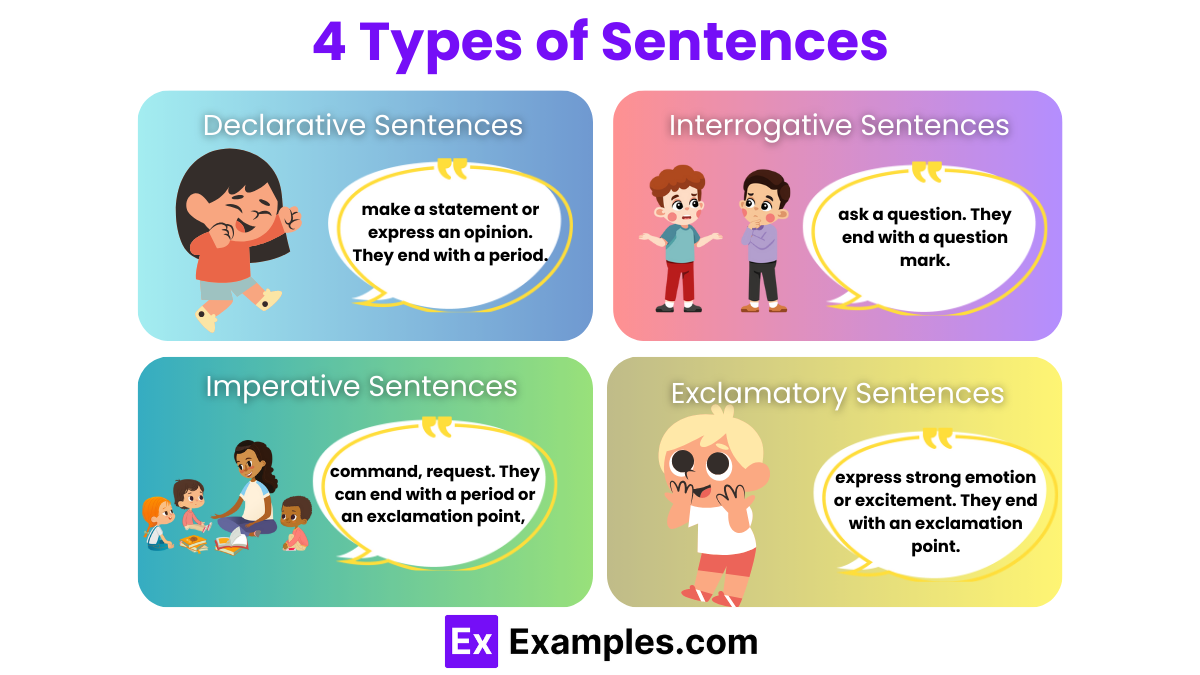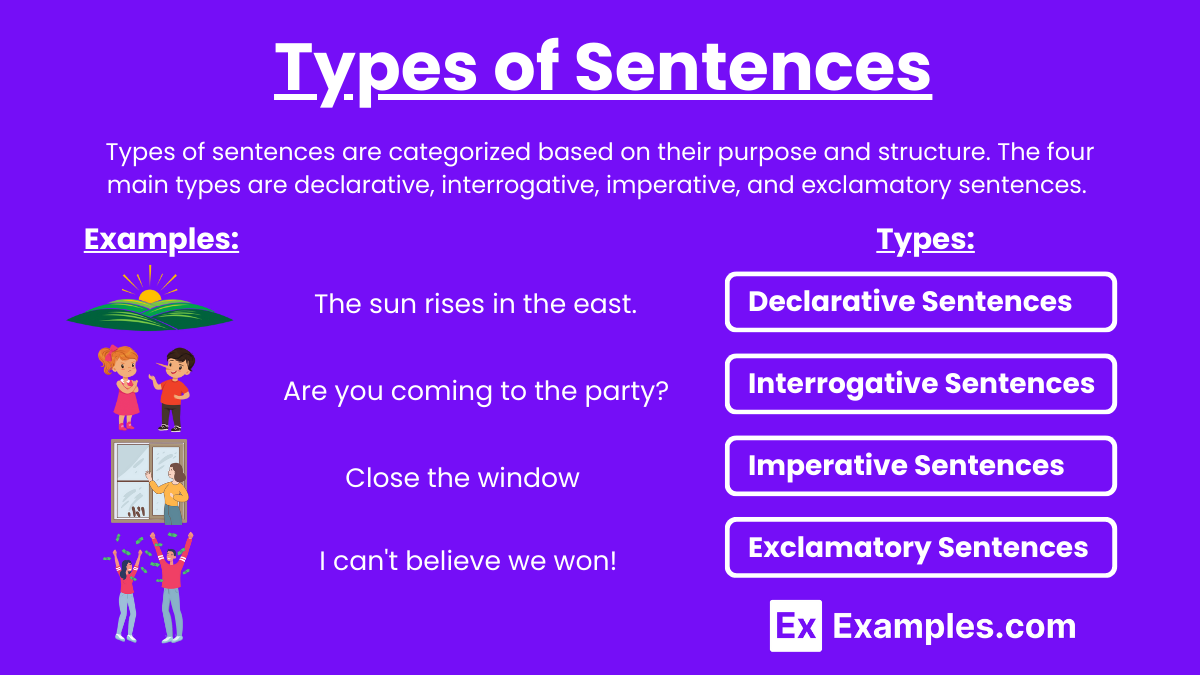Types of Sentences – 75+ Examples, Uses, Tips
Types of sentences are categorized based on their purpose and structure. The four main types are declarative, interrogative, imperative, and exclamatory sentences. Declarative sentences make a statement, like “The sky is blue.” Interrogative sentences ask a question, such as “What time is it?” Imperative sentences give commands or requests, for example, “Please close the door.” Exclamatory sentences express strong emotion, like “Wow, that’s amazing!” Each sentence type serves a unique function in communication, enhancing our ability to convey information effectively.
What Is a Sentence?
A sentence is a group of words that expresses a complete thought. It typically contains a subject, which is the person, place, thing, or idea that is performing the action, and a predicate, which tells something about the subject. A sentence begins with a capital letter and ends with a punctuation mark, such as a period, question mark, or exclamation point.
Types of Sentences
Types of sentences include declarative, interrogative, imperative, and exclamatory. Declarative sentences make statements, like “The sky is blue.” Interrogative sentences ask questions, such as “Is the sky blue?” Imperative sentences give commands, for example, “Close the door.” Exclamatory sentences express strong emotions, like “What a beautiful sky!” Each type serves a unique purpose in communication.
4 Types of Sentences

Declarative Sentences
Declarative sentences make a statement or express an opinion. They end with a period. These sentences provide information or state facts. For example:
- “The sun rises in the east.”
- “She enjoys reading books.”
Interrogative Sentences
Interrogative sentences ask a question. They end with a question mark. These sentences are used to request information. For example:
- “What time is it?”
- “Are you coming to the party?”
Imperative Sentences
Imperative sentences give a command, request, or instruction. They can end with a period or an exclamation point, depending on the intensity of the command. For example:
- “Please sit down.”
- “Close the window!”
Exclamatory Sentences
Exclamatory sentences express strong emotion or excitement. They end with an exclamation point. These sentences convey enthusiasm or urgency. For example:
- “What a beautiful day!”
- “I can’t believe we won!”
Each type of sentence serves a specific purpose, helping to convey different kinds of information and emotions effectively.
Examples of Types of Sentences
Declarative Sentences
- The cat is sleeping on the couch.
- She loves to paint in her free time.
- The book was very interesting.
- They are going to the movies tonight.
- Water boils at 100 degrees Celsius.
- He works as a software developer.
- The flowers in the garden are blooming.
- My favorite color is blue.
- The train arrives at 5 PM.
- She finished her homework early.
Interrogative Sentences
- What time is the meeting?
- Did you finish your assignment?
- Where did you buy that dress?
- Are they coming to the concert?
- How do you make this recipe?
- Is it going to rain today?
- Why did you leave the door open?
- Can you help me with this project?
- Who is your favorite author?
- Did you enjoy the movie?
Imperative Sentences
- Please pass the salt.
- Turn off the lights when you leave.
- Sit down and relax.
- Finish your dinner.
- Clean your room.
- Don’t touch that!
- Write your name on the paper.
- Call me when you get home.
- Keep the noise down.
- Follow the instructions carefully.
Exclamatory Sentences
- What a wonderful surprise!
- I can’t believe we won!
- You did an amazing job!
- That’s incredible!
- What a beautiful sunset!
- How exciting this is!
- This is the best day ever!
- I’m so happy for you!
- What a huge mistake!
- Watch out!
Types of Sentences for Class 3
Declarative Sentences
- The dog is barking loudly.
- She has a new bicycle.
- My favorite fruit is an apple.
- They are playing in the park.
- The sky is clear today.
Interrogative Sentences
- What is your name?
- Do you like ice cream?
- Where is your book?
- Are we going to the beach?
- Can you swim?
Imperative Sentences
- Close the door, please.
- Wash your hands.
- Eat your vegetables.
- Finish your homework.
- Listen to your teacher.
Exclamatory Sentences
- Wow, that’s amazing!
- Look at the rainbow!
- You did a great job!
- What a big dog!
- I love this game!
Examples of 5 kinds of Sentences
1. Declarative Sentences
- The restaurant serves delicious pasta.
- She is an excellent dancer.
- The museum opens at 10 AM on weekends.
- He bought a new laptop last week.
- The concert tickets are sold out.
2. Interrogative Sentences
- What is your favorite color?
- Have you ever been to New York?
- Which dress should I wear to the party?
- Why are you late for the meeting?
- Is this the right way to the station?
3. Imperative Sentences
- Don’t forget to submit your report.
- Please hand me the remote.
- Open the window to let some fresh air in.
- Pay attention to the instructions.
- Don’t touch that, it’s hot!
4. Exclamatory Sentences
- That was an incredible performance!
- What a surprise to see you here!
- This cake is delicious!
- How fast you ran!
- That was a fantastic game!
5. Conditional Sentences
- If you read more, you will improve your vocabulary.
- If it weren’t so cold, we would go for a walk.
- If she calls, tell her I’m busy.
- They will succeed if they work together.
- If you rest, you will feel better.
Types of Complex Sentences With Examples
1. When + Dependent Clause
- When she arrived, the meeting had already started.
- When you finish your homework, you can watch TV.
2. Because + Dependent Clause
- She stayed home because she was sick.
- They won the game because they practiced hard.
3. Although + Dependent Clause
- Although it was raining, we went for a walk.
- Although he didn’t study, he passed the test.
4. If + Dependent Clause
- If you need help, call me.
- If it rains, we’ll stay inside.
5. Since + Dependent Clause
- Since you asked, I’ll tell you the truth.
- Since he moved here, he has made many friends.
6. While + Dependent Clause
- While I was cooking, the phone rang.
- While he was reading, she was watching TV.
7. After + Dependent Clause
- After she finished her homework, she went to bed.
- After the movie ended, we went out for dinner.
8. Before + Dependent Clause
- Before you leave, lock the door.
- Before the sun sets, we should reach home.
9. As + Dependent Clause
- As she was walking, she found a coin.
- As he grew older, he became wiser.
10. Though + Dependent Clause
- Though it was expensive, she bought the dress.
- Though he was injured, he continued to play.
Purposes of Each Type of Sentence
Declarative Sentences
Purpose: To provide information or state a fact. Declarative sentences are used to convey information clearly and directly. They are the most common type of sentence in everyday communication, allowing the speaker or writer to share details, facts, opinions, or descriptions.
Interrogative Sentences
Purpose: To ask a question. Interrogative sentences are used to request information or seek clarification. They engage the listener or reader by prompting a response and are essential for conducting inquiries and fostering dialogue.
Imperative Sentences
Purpose: To give commands, requests, or instructions. Imperative sentences are used to tell someone what to do. They can be direct or polite, depending on the context and the relationship between the speaker and the listener. They are crucial for giving directions, making requests, or issuing orders.
Exclamatory Sentences
Purpose: To express strong emotions or excitement. Exclamatory sentences convey intense feelings such as surprise, joy, anger, or admiration. They add emphasis and emotion to the communication, helping to express the speaker’s feelings vividly and passionately.
Tips for different Types of Sentences
Declarative Sentences
- Be Clear and Concise: Ensure your statement is straightforward and easily understood.
- Use Proper Punctuation: Always end with a period.
- Provide Relevant Information: Include details that are necessary and helpful.
Interrogative Sentences
- Start with a Question Word: Begin with who, what, where, when, why, or how to ask informative questions.
- Use a Question Mark: Always end with a question mark.
- Be Direct: Ask clear and precise questions to get specific answers.
Imperative Sentences
- Use Commanding Language: Start with a verb to give clear instructions or commands.
- Choose the Right Punctuation: Use a period for mild commands and an exclamation point for strong commands.
- Be Polite When Needed: Add “please” to make the request polite, especially in formal situations.
Exclamatory Sentences
- Express Strong Emotions: Use words that convey excitement, surprise, or other strong emotions.
- End with an Exclamation Point: This punctuation emphasizes the intensity of the sentence.
- Use Sparingly: Too many exclamatory sentences can overwhelm the reader; use them to highlight key emotions or points.
FAQ’s
Can a sentence be more than one type?
No, a sentence typically fits into one specific category: declarative, interrogative, imperative, or exclamatory.
How can you identify a declarative sentence?
A declarative sentence is a statement ending with a period. Example: “The sky is blue.”
How do you recognize an interrogative sentence?
An interrogative sentence asks a question and ends with a question mark. Example: “Are you coming?”
What punctuation ends an imperative sentence?
An imperative sentence often ends with a period but can also end with an exclamation mark for emphasis.
Why is “Wow, that’s amazing!” an exclamatory sentence?
It expresses strong emotion and ends with an exclamation mark, making it an exclamatory sentence.
Can an imperative sentence be polite?
Yes, imperative sentences can be polite. Example: “Please pass the salt.”
What kind of sentence asks “What time is it?”
“What time is it?” is an interrogative sentence because it asks a question.
How do sentence types affect writing?
Using a variety of sentence types makes writing more engaging and dynamic, helping to convey different tones and intentions.
Can an interrogative sentence be rhetorical?
Yes, a rhetorical question is a type of interrogative sentence that doesn’t require an answer. Example: “Who wouldn’t want to win the lottery?”
What sentence type is “Can you help me?”
“Can you help me?” is an interrogative sentence because it asks a question.



